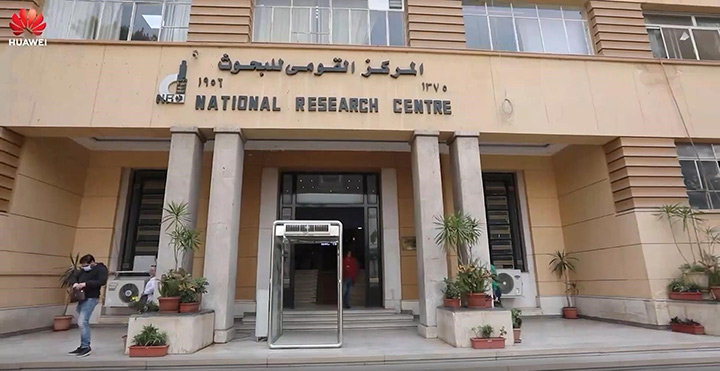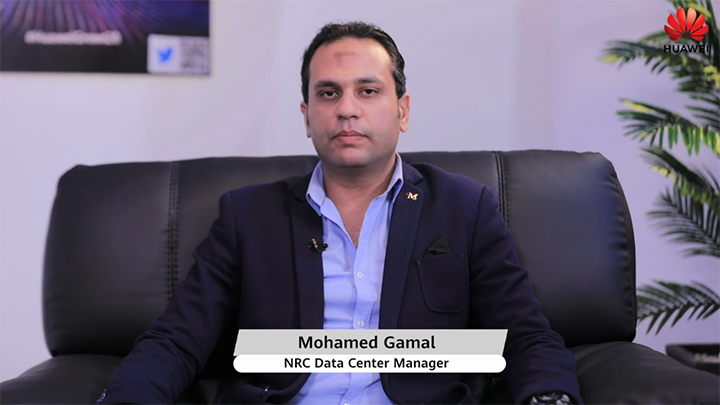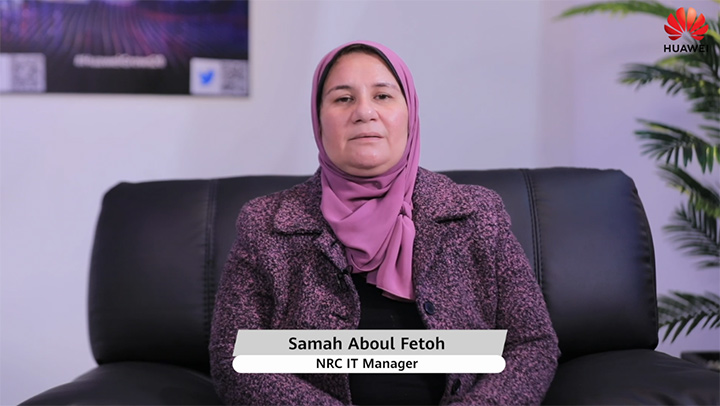Entering a New Digital Era for Scientific Research in Egypt
This site uses cookies. By continuing to browse the site you are agreeing to our use of cookies. Read our privacy policy>
![]()
Enterprise products, solutions & services

Founded in 1956, Egypt's National Research Centre (NRC) is part of the country's Ministry of Scientific Research. Indeed, it accounts for approximately 60% of all the Ministry's scientists and is the largest multidisciplinary research and development center in the country. As such, NRC already leads Egypt's scientific research — and its importance is only set to grow.

Digital transformation — rather the lack of it — has become an important factor in the research field, as elsewhere. As Mohamed Gamal, Manager of the Data Center at NRC, said: "NRC had dozens of equipment rooms, which were used to support the business work of more than 4000 researchers. But they were distributed in different locations, in 16 buildings across campus. To ensure the normal operations of these equipment rooms, we had to shuttle between office buildings every day to perform equipment detection and Operations and Maintenance (O&M) tasks. Manual O&M like this, plus the scattered layout of the equipment rooms, severely restricted our O&M efficiency."
In this difficult and complex O&M environment, lacking a remote O&M platform, the team of 11 — with two dedicated to data center tasks — struggled to understand the overall running status of NRC's equipment rooms. Instead, the team was left performing onsite maintenance and troubleshooting by hand. With power supply and cooling systems so vital to stable and reliable operations, technical bottlenecks were beginning to blight NRC's important work. Indeed, it was not uncommon for multiple equipment faults to occur on the same day. With troubleshooting and repairs requiring up to two days to complete, the continuity of the center's scientific research was constantly under threat.
With the number of its research projects only growing, the center's service requirements were increasing too. Simply adding servers and storage devices to each of the scattered equipment rooms was not a viable option: besides, this approach simply wouldn't meet capacity expansion needs. Planning capacity expansion for its equipment rooms was therefore proving a key challenge, with NRC mindful that, moving forward, O&M couldn't be allowed to become too complex in the quest for maximum efficiency, post-expansion.
In recent years, the Egyptian government has placed its full weight behind digital transformation, launching the Digital Egypt program, an all-encompassing vision and plan that details the foundations for the transformation of Egypt into a digital society. In this wholly supportive environment, NRC decided to take a lead and set about implementing policies that would drive Egypt's scientific research sector into the digital era.
NRC soon came to realize that the construction of a new, centralized data center could solve many of its problems, boosting O&M efficiency and improving reliability. Indeed, such a data center could become a showcase for Egypt's scientific community, cementing NRC's position of leadership and trailblazing the way for the future digital development and reform of Egyptian research.

Realistically speaking, most research institutions in Egypt aren't in a position to be able to invest either a large amount of physical space or labor costs to construct and maintain data centers. But Huawei's fully modular and pre-integrated FusionModule2000 Smart Modular Data Center stands out from other vendors' solutions. A next generation, smart modular data center solution — awarded the world's first "Uptime Tier IV Ready" certification — it integrates power, cooling, racks, cabling, and management systems. This means it can be quickly deployed in a relatively small space, and at an extremely competitive price-point. Samah Aboul Fetoh, NRC's Information Technology (IT) Manager, said: "Huawei is virtually the only vendor to offer a data center that requires such a small space. It's a unique offering, unmatched by any other provider." Now, NRC's new data center implements full-lifecycle management, with power supply, cooling, and O&M all managed remotely — and intelligently. The solution has effectively resolved the problems that were becoming of real concern with the legacy equipment in place, from poor O&M efficiency to unsatisfactory reliability, making it a true benchmark for Egypt's scientific community and the very first data center to be constructed among all members of the Ministry of Scientific Research.
NRC's new data center benefits from Huawei's NetEco, an intelligent management system that visualizes the operating status of the equipment room environment, cooling, power supply, and distribution subsystems. It implements proactive defense, rapid fault location, and proactive fault isolation, making O&M far simpler for the center's staff, lowering skill requirements and helping to ensure stable services.
The Huawei Uninterruptible Power Supply (UPS) NRC now relies on has a modular redundant design, preventing any Single Point Of Failure (SPOF). In addition to the physical partition of the equipment room, each micro-module is configured with an independent access control system. Different services and modules are hierarchically graded to ensure the security of different scientific research services.
With Huawei's fully modular design, prefabricated in the factory, each module is an independent, small data center. With the power supply able to be flexibly configured, based on service requirements, online capacity expansion — within just five minutes and without the need to power-off — is fully supported, slashing the initial investment required and effectively implementing a pay-as-you-grow model, a far preferable solution for any organization. Indeed, having initially built its new data center to connect all buildings across its own campus, NRC is now looking at a more ambitious plan: to construct a cloud platform that links research institutions nationwide.

"We look forward to further cooperation with Huawei. It proves every day that it is a pioneer in the field, not only keeping pace, but setting trends with the latest technologies." Samah Aboul Fetoh said. She added: "Speaking as NRC's IT Manager in charge of digital transformation, we desperately needed to begin the digital transformation journey and own our own smart data center. This will facilitate and secure our transformation and, with Huawei, we have finally found what we were searching for: a solution, account team, and overall design that fulfills our exact needs. The reforms undertaken have ultimately brought many benefits and we have enjoyed full cooperation with Huawei during deployment. The Huawei Technical Assistance Center (TAC) and delivery team continues to provide support for any and every service we need."